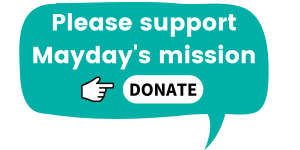A learning curve and introduction to the world of PTS Coaches
Martha Bishop, Head of Partnerships at Mayday looks at the vital role of PTS Coaches and why they stand out in a system driven by deficits and power imbalance.
Firstly I would like to say loud and clear that I think PTS Coaches are awesome!
I joined Mayday in January 2018 and specifically remember being so humbled and inspired as I learned more about the Personal Transitions Service and how PTS Coaches work and what they do. It was very clear to me, first and foremost they work on building positive, and respectful relationships with people. Our Wisdoms for the Street told us that this relationship is vital when working with people going through tough times and it makes perfect sense to me. There’s a wealth of research telling us it’s the quality of the relationship that makes a difference when working 1-2-1 with people – it’s so obvious and I hope it becomes valued and recognised throughout the system. I love it when I meet policy makers, tender writers, commissioners, funders, managers and others who really get this!
When we listened to people they told us that often the ‘helping and support’ system dehumanises, degrades and humiliates them, having to relay all the negative information about themselves. Sometimes this is a requirement to access a service, ‘go there if you are suffering with your emotional wellbeing’, or ‘If you drink or take drugs you can go over there’. Imagine needing to relay this sort of information about yourself in order to get something you need to live. I feel pretty ashamed that I’ve been part of this system, part of the problem.
Anyway, back to the important reason for writing this blog. PTS Coaches try to redress the imbalance of power people going through tough times are likely to have experienced. Just take a moment to think about the power you have in your life, the choices you can make. Now imagine feeling really powerless, like you don’t have any choices, or your choices are one dreadful situation or another slightly less dreadful situation!
PTS Coaches treat people like people – what a breath of fresh air! Not judging someone on a 12 page ‘risk assessment’, followed by a list of negatives and past experiences that really don’t make you feel good about yourself. Oh and don’t get me started on ‘risk assessments’! They should be re-named ‘how to cover the backs of the people in power’ assessments – but I digress again, that’s for another day.
PTS Coaches get to know people, not by asking what have you done, but what has happened to you? They help people to recognise their strengths, talents and abilities and they encourage them to focus on their assets. Coaching is about encouragingly, supportively asking questions to help people learn and understand more about themselves and how life has led them to where they are. Not blaming, but listening, really listening to people. Getting to know them and NOT their deficits. Coaches encourage people to find their own personal motivation, not tick a box and they certainly don’t try and get them to do things that someone else thinks they ‘should’ be doing.
Coaches really listen and offer space for people to find their own hope for their future. I think one of the crucial elements of a PTS Coach’s role is to help people see they are worthy, important, have a right to choose and deserve to make their own decisions about what’s important to them. To be able to decide what they really want to do with their life. Coaches don’t tell people what to do or advise, but walk alongside people whilst they take responsibility for making their own decisions, choosing to do things they want to. All this without putting people in boxes, without signposting or referring to segregated services.
I love how coaches encourage and enable people to build relationships outside the homelessness sector by removing barriers and brokering personalised opportunities. When I reflected on this I was saddened that in previous roles I have often set up ‘special’ aka segregated group , thinking I was ‘helping’ people, it really smacked me right between the eyes how dis-abling this was – what message would this have given to people? ‘Oh yes you can do that, but only with your ‘own kind’. I am sincerely sorry to anyone reading this who I ever encouraged to set up or attend a segregated group.
PTS Coaches are so important, they focus on removing system barriers for people, as they arise for the person they are working with, helping to make the current system better for people.
I hope if I ever do go through such tough times, a PTS Coach is there for me, as my ally; as my supportive, encouraging, non-judgemental sounding board. Providing a safe space whilst I realise what is really important to me and patiently work with me to explore what options I have. Ultimately helping me to remove the barriers in my way to help me get to where I want to be.
Go you awesome PTS Coaches!


